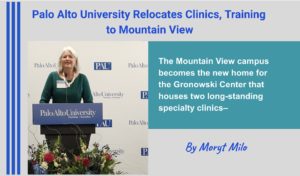 By Moryt Milo
By Moryt Milo
The air was crisp and the energy was electric as Palo Alto University (PAU) opened its Mountain View campus just steps away from the city’s downtown core.
The small private nonprofit university has only one mission—to graduate doctoral, master’s, and bachelor’s students in the field of behavioral health—which the university has been doing for close to 50 years. The school, with an enrollment of nearly 1,200 students, each year graduates more than 300 students including 150 mental health counselors and 100 clinical psychologists.
In an era when Santa Clara County is struggling with a severe workforce shortage in the behavioral health sector, Palo Alto University’s impact is incredibly important, said retired State Sen. Jim Beall, a university board trustee.
“It took a lot of hard work to get us here today and it was without any government support,” he said, but pointed out that the city of Mountain View was all in.
As politicians, educators, advocates, and university staff gathered to celebrate the new campus, University President Maureen O’Connor said, “This is an amazing, historic moment for Palo Alto University. This will be a hub of activity. A home of learning, research, teaching, and a training clinic.”
The Mountain View campus becomes the new home for the Gronowski Center that houses two long-standing specialty clinics—La Clinica Latina and the Sexual and Gender Identities Clinic (SGIC)—along with its E-clinic which includes teletherapy.
The move comes at a fortuitous time, O’Connor said. The prior clinic had been located off El Camino in Los Altos for many years. Although it sat along a bus route, it wasn’t in the best location. When the building was sold to make way for condominiums, O’Connor said the situation presented an opportunity that made more sense for the university and its community partners to be closer together. The main campus is still located at 1791 Arastradero Road in Palo Alto.
Some of PAU’s key partners include Stanford School of Medicine’s Psychiatry Department, Palo Alto and area Veteran’s Affairs centers, LifeMoves, and Community Health Awareness Council (CHAC) which provides counseling and mental health services. The latter two have locations in Mountain View.
The new location at 1172 Castro Street brings the university into the heart of the community. The campus sits near a bus line, train station, and is even accessible for cyclists. The school secured a long-term lease in a medical complex and the landlord is an advocate of the university’s work. Everything fell into place, O’Connor said.
“The community has embraced us and we had to be somewhere where the work we do is valued,” she said.
It will be easier for clients to access La Clinica Latina offering bicultural and bilingual psychological services in Spanish for children through adults. The same applies to the Sexual and Gender Identities Clinic that provides psychotherapy services for individuals that identify as lesbian, gay, bisexual, transgender, and those questioning their gender or sexual identity. Both services are offered on a sliding scale.
The clinic sees about 450 clients in the community and it’s here that the students train under close faculty supervision.
A Diamond in the Rough
O’Connor said, “One of the things that made me want to move across the country and run this amazing hidden gem is the incredible faculty that is also serving the community in various ways.” The faculty at the university sits on a variety of boards, works in schools, and is doing research that’s needed to better understand the behavioral health issues we are dealing with, she said. They make “our work so powerful,” as they prepare students to come into the region.
Santa Clara County Superintendent of Schools and university board trustee Mary Ann Dewan said the relocation of the clinic and teaching facilities increases PAU’s visibility and demonstrates how it is contributing to workforce development.
“The school is an anchor,” she said, “and the students and faculty have so many entry points into the local community.”
As O’Connor looks into the future and the work that lies ahead in the behavioral health sector, she said there needs to be a sea change in how clients receive treatment. Many agencies don’t have a multidisciplinary team approach, she said. If an agency thinks all it needs to do is add another counselor to distribute some of the caseload, that is a very different mindset from an interdisciplinary team that includes a psychiatrist, psychologist, social worker or mental health counselor, and a peer support member, she noted.
“Right now, a client comes in and gets assigned a counselor,” she said, “and that counselor may have ten individuals with serious mental illness and other clients with various issues.”
That doesn’t really work out over the long term, she said. The sector needs to have a more holistic approach to care that has a health and psychology emphasis, a more multidisciplinary plan that can work in various settings such as hospitals and prisons.
She also talks about ways the university can collaborate with community partners to help train staff and that advances their careers internally. This would be easier than constantly trying to hire from the outside, she said.
“This is an opportunity for us to embed ourselves and feel like a real partner in the community in a way I just didn’t feel we had before,” O’Connor said, about the new campus. “I really want us to feel that we are connected and can serve the broader community.”
For more information about the Gronowski Center and its services, call 650-961-9300 or go to www.gronowskicenter.org
For more information about Palo Alto University click here










































